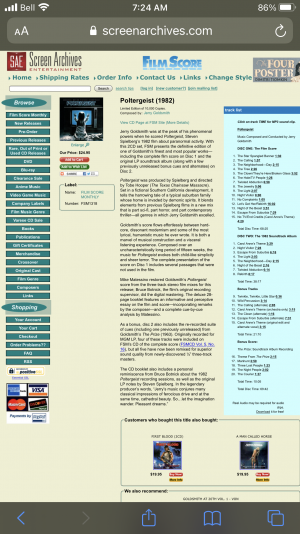gussunkri
Senior Member
Nice!Screen Archives Entertainment
www.screenarchives.com

Just one more question (sorry). My two favorite tracks off of the album are "Twisted abduction" and "Rebirth". I find them both to be sublime. I worry that neither title is present in the overview of the book from Omni. Could it be that "Twisted abduction" is the same as what Omni refers to as "The Closet" and that "Rebirth" is the same as what Omni calls "Lets get her, part 2"?
EDIT: Also, I feel myself much more enticed by all the scores at Omni than by the 50% Spitfire sale. Surely that must be against the VI-control rules?! (Though, to be honest, my love affair with Staffpad is probably just as much of an explanation.)




